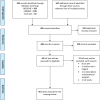Training general practitioners in melanoma diagnosis: a scoping review of the literature
- PMID: 33757946
- PMCID: PMC7993310
- DOI: 10.1136/bmjopen-2020-043926
Training general practitioners in melanoma diagnosis: a scoping review of the literature
Abstract
Background: General practitioners (GPs) play a key role in early melanoma detection. To help GPs deal with suspicious skin lesions, melanoma diagnostic training programmes have been developed. However, it is unclear whether these programmes guarantee the acquisition of skills that will be applied by GPs in their daily clinical practice and maintained over time.
Objectives: This scoping review aimed to examine and compare educational programmes designed to train GPs in melanoma diagnosis using clinical (naked eye) examination alone or dermoscopy±clinical examination, and sought to inform on the long-term sustainability of the GPs' acquired skills.
Eligibility criteria: Studies eligible for inclusion evaluated educational programmes for teaching diagnosis of melanoma to GPs. MEDLINE, EMBASE and Cochrane databases were searched for relevant articles from 1995 to May 2020.
Results: Forty-five relevant articles were found assessing 31 educational programmes. Most programmes that improved the diagnostic accuracy and long-term performances of the GPs, that is, increase in confidence, decrease in dermatologist referral for benign skin lesions and improvement in the benign/malignant ratio of excised skin lesions, trained the GPs in clinical diagnosis, followed by dermoscopy. To maintain long-term performances, these programmes provided refresher training material.
Conclusion: This review shows that studies generally report positive outcomes from the training of GPs in melanoma diagnosis. However, refresher training material seemed necessary to maintain the acquired skills. The optimal form and ideal frequency for these updates have yet to be defined.
Keywords: dermatological tumours; education & training (see medical education & training); general medicine (see internal medicine).
© Author(s) (or their employer(s)) 2021. Re-use permitted under CC BY-NC. No commercial re-use. See rights and permissions. Published by BMJ.
Conflict of interest statement
Competing interests: None declared.
Figures
References
Publication types
MeSH terms
LinkOut - more resources
Full Text Sources
Other Literature Sources
Medical

